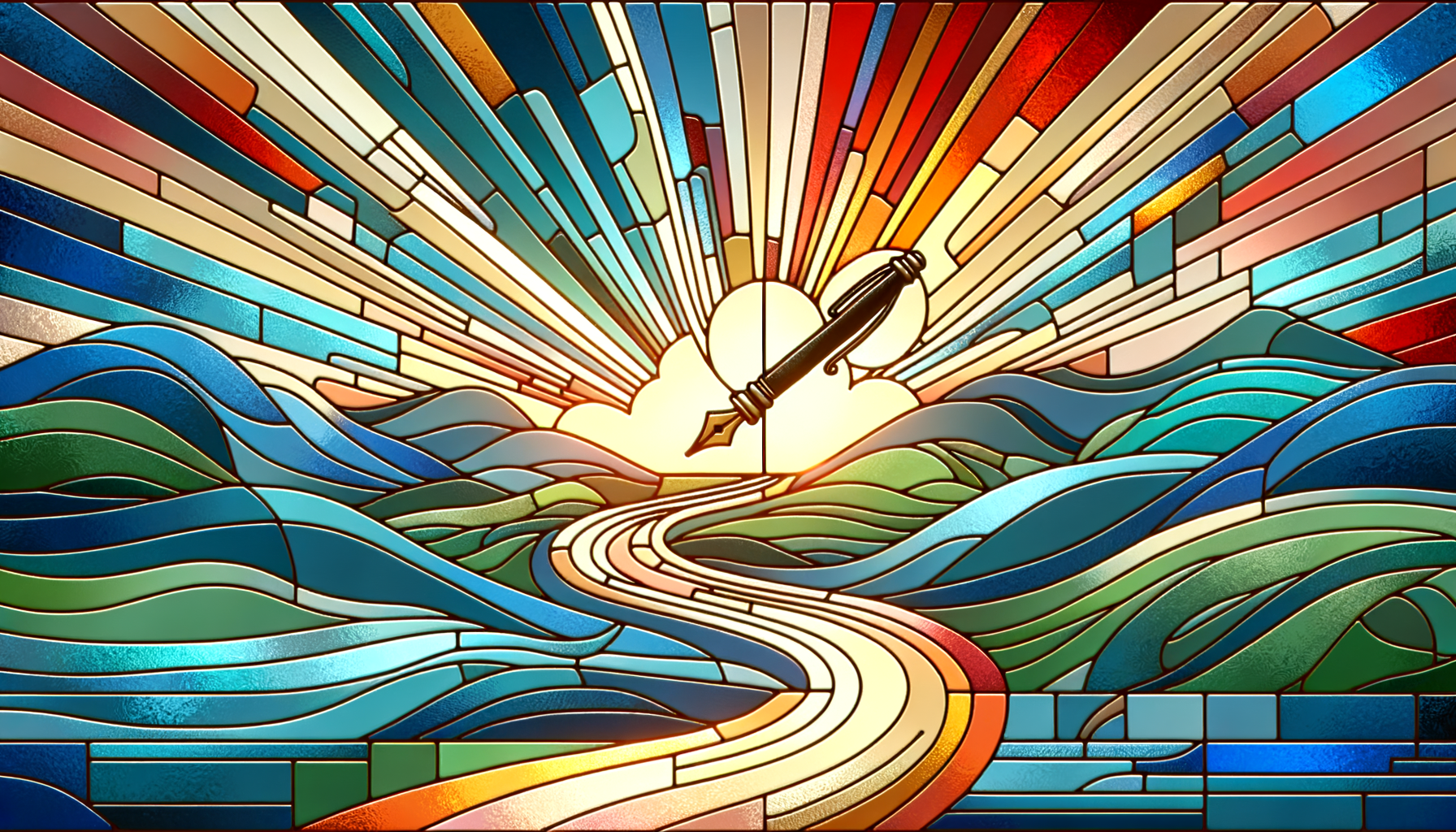I still remember the first time I truly fell in love with writing. I was twelve, sitting at our family’s old oak kitchen table, tasked with a school assignment to craft a story about anything my heart desired. Outside, the Wasatch Mountains glowed orange under the setting Utah sun; inside, my siblings were debating the finer points of whose turn it was to rinse the dishes. But I was lost in the world I was building—a very dramatic saga involving a time-traveling detective who solved crimes in medieval Europe (because, naturally, that’s where my preteen brain went).
The joy I felt writing that story lit something inside me I haven’t been able to extinguish since—not that I’d ever want to. Writing became my personal time machine, my uncharted trail through the wilderness, my confessional booth where no one interrupted. It was thrilling, comforting, and just the right amount of terrifying, like singing the wrong note during an acoustic jam session and still somehow getting an applause.
But more than anything, writing has taught me how to connect—with myself, with others, and with what it means to be human. It’s why I write, and why I keep writing, even on the days when the words come slower than molasses in a Salt Lake January. If you’re still reading, let me explain.
Writing as Self-Discovery: The First Adventure is Inward
Growing up, a lot of my life was carefully prescribed. That’s what happens in a devout Latter-day Saint household—rules are clear, boundaries are firm, and community expectations often feel more permanent than the mountains looming over the valley. There were things you just didn’t question.
But here’s the thing about writing: it encourages questions. What if this character refuses to follow the rules? Why does this memory keep surfacing in my essays? How do faith and individuality co-exist—or do they? The more I wrote, the more I pushed the boundaries of what I believed and who I thought I was. My Religious Studies classes in college only deepened that exploration, but it was through ink and paper (and later, relentless keyboard clatter) that I truly excavated my mind and heart.
For me, writing feels like those long hikes in Zion National Park—sometimes your path is laid out clearly, other times you’re bushwhacking alongside steep cliffs. Either way, you’re figuring out who you are with every step.
And let me tell you, nothing feels better than reaching an unexpected clearing.
Writing as Connection: Bridging the Spaces Between Us
Relationships have always fascinated me. From flirtation to heartbreak, the dance between two people feels as epic as any saga I could dream up. Writing has helped me understand those experiences more fully, both on the page and in my personal life. Whether I’m penning short stories or reflecting on awkward teenage dates where I tried way too hard to seem "deep" (conversational tip: quoting Shakespeare doesn’t make you mysterious, it makes you sound like a very earnest librarian), writing allows me to find meaning in even the most cringeworthy moments.
Take breakups, for example. They’re the worst, right? They toss your heart into a blender and then hand you the puree, leaving you wondering why you ever tried “sharing your truth” in the first place. But when you write about those messy wounds, something transformative happens. You gain perspective. You learn what you want, what you don’t, and what weird patterns keep showing up in your relationships (like the fact that I always seem to date people who love ultimate frisbee).
Through storytelling, I’ve found empathy for myself and others. Writing about love—its highs, its heartbreaks, its complexities—makes you soft yet resilient. It reminds you that connection is universal, even if we all fumble it.
Writing as Play: Why Words Can Be Your Wingman (or Wingwoman)
Here’s the thing no one ever tells you: writing can actually be really, really fun. It’s like flirting with life — you throw out a line, see if it gets noticed, and if it doesn’t, you tweak it and try again. Who knew words could have so much… charm?
For me, humor often sneaks in as playfulness when I write. I mean, life is absurd enough as it is—why not have a little fun with it? When my family isn’t asking whether I’ll ever get to the part of my “long essays” where someone falls in love or dies dramatically (thanks for that feedback, Grandma), I’m usually chuckling to myself over an unexpectedly weird metaphor or pop culture reference that somehow fits. Writing is where I let silliness and sincerity coexist—just like in relationships.
Take your love life, for instance. Every first date has at least one mishap worthy of a three-paragraph comedy sketch. Once, I went on a date where I accidentally tripped while trying to open a car door (always a valiant maneuver, trust me). Another time, I introduced someone to the glory of green Jell-O (a Utah rite of passage, obviously) only for them to confess hours later that they were allergic to gelatin. Romance may thrive on its serious moments, but it breathes best when there’s laughter.
Writing reminds me to hold onto that levity. Yes, words are powerful, but they’re also endlessly playful. Never forget that punctuation is just glorified confetti for your sentences.
Writing as Legacy: Leaving a Trail
One of my favorite hikes near Salt Lake City is up to Lake Blanche. It’s hard going—5+ miles of steep incline—but the reward at the end? An alpine lake so reflective it feels like something out of a Monet painting. Sometimes when I hike there, I think about the people who built the trail—people I’ll never know but who laid the stones so I could follow them.
Writing is like that. Leaving stories behind, whether personal or fictional, is a way of building trails for others to follow. Even if my own path through life has taken unexpected diverges from tradition, I write in part because I want to give others a map. I want someone else, somewhere, to feel seen reading my words and think: Oh. I’m not alone.
In relationships, I think we crave that same kind of connection—a conversation that lingers well beyond its final pause. While my writing isn’t as loud or flashy as a mosh-pit crash (for the record, I’ve never been to one—can’t say they’re big in Utah), I do hope it resonates. That’s why, despite rejections and rewrites, I keep returning to the blank page. It’s where I get to craft a legacy, however small.
Writing as Practice: Just Keep Going
At the end of the day, writing, like love, is an act of faith. You show up every day, put one word after another, and trust the process. Some days it rains brilliance; other days it drizzles mediocrity. But you keep going, knowing that every step—stumbling ones included—is part of a larger journey.
So, why do I write? To discover, to connect, to play, to leave something behind, to keep practicing. Writing is my hiking trail, my time machine, and sometimes, on bad days, it’s my green Jell-O—too weird to fully understand but always worth coming back to.
If you’ve ever hesitated to pour yourself into something—be it words on a page, a first date, or a big romantic gesture—consider this your nudge. Show up. Take a stab at it. Write your heart into your life, one story (or hike) at a time. You won’t regret it.
And if you trip opening a car door? Just write about it later—it’ll make a great story.




















